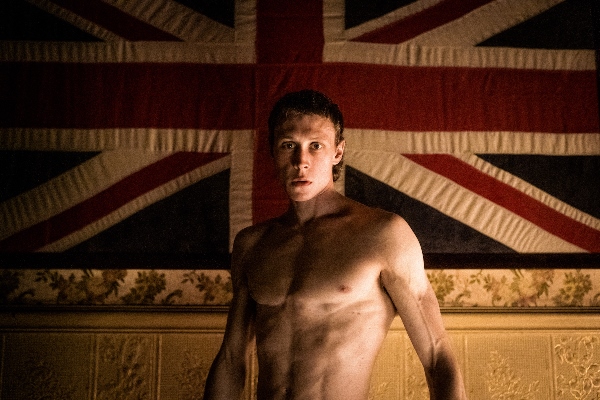
Outlaws, whether painted sympathetically as victims or misguided monsters or complex figures that fall into all or neither categories, are infinitely fertile subjects in cinema. Ned Kelly, the 19th-century Australian bushranger, has been depicted on celluloid many times before. The Story of the Kelly Gang (1906) is generally recognized as the first feature-length film, and in 2003, two very different films were released: Gregor Jordan’s Ned Kelly and Abe Forsythe’s satirical Ned.
In Justin Kurzel’s True History of the Kelly Gang, Ned himself sets out to tell his own story, the “true” one, so that his son will not believe the lies his enemies have spread about him. Based on the novel by Peter Carey, the movie is striking, at times exhilarating, but ultimately uneven, but still it presents a fascinating addition to the depictions of Kelly, if not to outlaw cinema.
Young Ned Kelly (Orlando Schwerdt) is born into a harsh world; he and his family are Irish and subject to British colonial rule. His mother (Essie Davis), while encouraging a rebellious streak in her children, is forced consistently to compromise. In one of the very first shots, Ned observes her performing oral sex on an English soldier in exchange for the family’s safety. This is a recurring theme, in which the downtrodden are driven by their oppressors to make difficult decisions. This leads an older Ned to form his gang and strike out against the police. What he wants his son to know, more or less, is that he was not a malicious enemy of society but its victim.
As it turns out, what it means to be a man is also one of the film’s themes. Repeatedly, Ned runs from and runs toward the violent behavior that is expected from him, and many of the men speak to each other as though trying to destroy one another’s sense of masculinity. And yet, cross-dressing is a prominent motif, most notably when Ned and his gang don dresses for their rampages. Their reasoning is that it terrifies people—only a crazy man would wear a dress.
Generally speaking, the performances are strong. Davis is fierce and wild, and George Mackey (the adult Ned) convincingly conveys the anger, fear, and indignation necessary for Ned, as well as his eventual spin into madness. One does feel that Thomasin McKenzie, one of the more exciting actors to emerge in recent years, is somewhat underused as George’s romantic partner. Nevertheless, she acts, as always, with quiet, subtle grace.
We are introduced to the desolate badlands of Australia in a tracking shot that follows a figure on horseback bolting through a misty landscape of barren trees and dying grass. Striking images such as this are a dime a dozen here—location and imagery are enormous strengths of Kurzel, who has a background as a theatrical designer.
However, where the movie will both lose and win fans is in its third act. As Ned and his gang have assembled against the police who are hunting them, Kurzel shifts into a postmodern, expressionistic mode, in which the era shifts to a time that looks more like today. At this point, scenes become fragmented and hallucinatory, and the overall effect is vertigo inducing. There are some very powerful images, but the narrative loses focus and impact. Kurzel’s impulse to play with the era in which the story is set is intriguing, but I couldn’t see what it yielded, other than to signify that Ned and his compatriots’ predicament remains relevant. Yet the film had amply demonstrated this point. (Christian Petzold’s Transit, which mixes eras throughout, is much more effective.)
Still, True History of the Kelly Gang is likely to fascinate many viewers, and the pace never flags. It recalls in some ways Fred Schepisi’s much better film The Chant of Jimmie Blacksmith (1978), in which a mixed-race Aborigine is similarly pitted against a hostile social order. Whether you are or are not intrigued by Kurzel’s directorial choices, his film will be a conversation starter. Above all, it stands out as a compelling portrait of a man driven to the edge.
















Leave A Comment